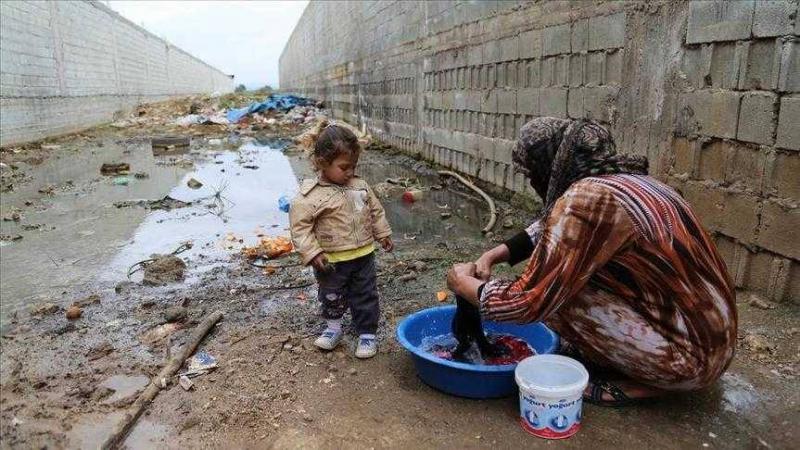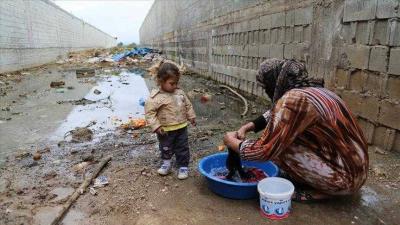The outbreak of cholera poses a significant threat across various regions in Syria, regardless of the controlling powers, although areas under control of the regime are the most affected. Concerns are heightened by the spread of the disease in overcrowded camps for displaced persons, where essential living conditions and clean drinking water are scarce. Official statistics from the Ministry of Health in Damascus indicate that Aleppo and Deir ez-Zor governorates in northern and eastern Syria account for the highest number of cholera cases, which continue to spread in both regime-controlled areas and those under the "autonomous administration" and opposition. Meanwhile, the regime government is imposing strict measures in an attempt to control the outbreak.
The number of deaths in regime-controlled areas has risen to 44, with reported infections totaling 908, according to reports from the Damascus Ministry of Health. The ministry also recorded 558 cases in Aleppo, 165 in Deir ez-Zor, 68 in Hasakah, 33 in Raqqa, 28 in Latakia, 19 cases in Sweida, 11 in Damascus, 10 in Hama, 7 in Homs, 5 in Daraa, 2 in Rural Damascus, and one case each in Quneitra and Tartus.
In contrast, the "Early Warning and Epidemics Network" reported a rapid spread of the epidemic in areas outside regime control in northern and eastern Syria, with about 14,844 cases reported up to Thursday, 1,755 in the northwest of the country, and 374 cases in the "Peace Spring" area. The Ministry of Health in the "Interim Government" confirmed the deaths of two individuals due to cholera in northeastern Syria, urging health workers to report suspected cases in facilities and communities and provide verification facilitation.
In Idlib, the "Health Directorate of Idlib" issued a statement, ringing the "alarm bell" over the ongoing cholera spread in regime areas and the "Syrian Democratic Forces" (SDF). The statement highlighted the disastrous humanitarian conditions faced by residents in northwestern Syria, where there is a high population density, widespread camps, difficulties in securing clean drinking water, and the presence of sewage systems near the camps.
UN Deputy Special Envoy for Syria, Najat Rushdie, warned yesterday (Friday) that the cholera situation in Syria "could become catastrophic" during her chairing of a humanitarian task force meeting held in Geneva. Rushdie stated, "There is an urgent need for assistance, and sustainable access without obstacles to affected communities is imperative."
Sources in regime-excluded areas in northern Syria indicated a rapid cholera spread in eastern and northwestern Syria, emphasizing the urgent need for emergency medical aid. They noted that the primary cause of the cholera spread is contaminated water, coupled with a lack of hygiene supplies and healthcare, noting the highest rates of cholera spread in impoverished and vulnerable areas.
The "Support Coordination Unit" is seeking to propose a vaccination program to the World Health Organization, although success in this endeavor is not expected, given that the vaccine is expensive, providing individual protection but not eliminating the epidemic, as the underlying issues relate to contaminated environments, particularly water, levels of environmental and health awareness in the community, and also the living standards. The struggle for clean water has become exhausting for poor Syrian families, where the price of a barrel of drinking water exceeds twenty thousand Syrian pounds. According to sources, this has negatively impacted hygiene behaviors.
The spokesperson for the UN Secretary-General, Stephan Dujarric, previously reported that the increase in cholera cases is attributed to severe water shortages throughout Syria due to low water levels in the Euphrates River and drought-like conditions. It is essential to note that the first cholera cases in rural Deir ez-Zor were recorded due to contamination of the Euphrates River; reports indicate that more than 5 million people in Syria rely on the Euphrates River for drinking water.
Dujarric mentioned that UN partner organizations are facing shortages of cholera control supplies, such as medicines, water, sanitation, and hygiene supplies, noting that the destruction or damage of water infrastructure has forced people to rely on unsafe water sources.
UNICEF has warned that as the outbreak of this disease spreads, it also threatens children's health. Since the cholera outbreak announcement on September 10, UNICEF has distributed 60 sets of acute watery diarrhea treatment kits in the most affected governorates to support treatment in health facilities and at the community level.
Over the past two weeks, 408 tons of sodium hypochlorite have been distributed to increase chlorine doses and concentrations to prevent and reduce the spread of the disease, especially in extremely vulnerable and weak communities, enabling ten million people across the country to access safe and clean water.
In a statement, UNICEF noted that supplies included acute watery diarrhea treatment kits to support health facilities and communities in treating 36,000 cases of acute watery diarrhea, along with water purification tablets to help 350,000 people treat water to meet household needs.




